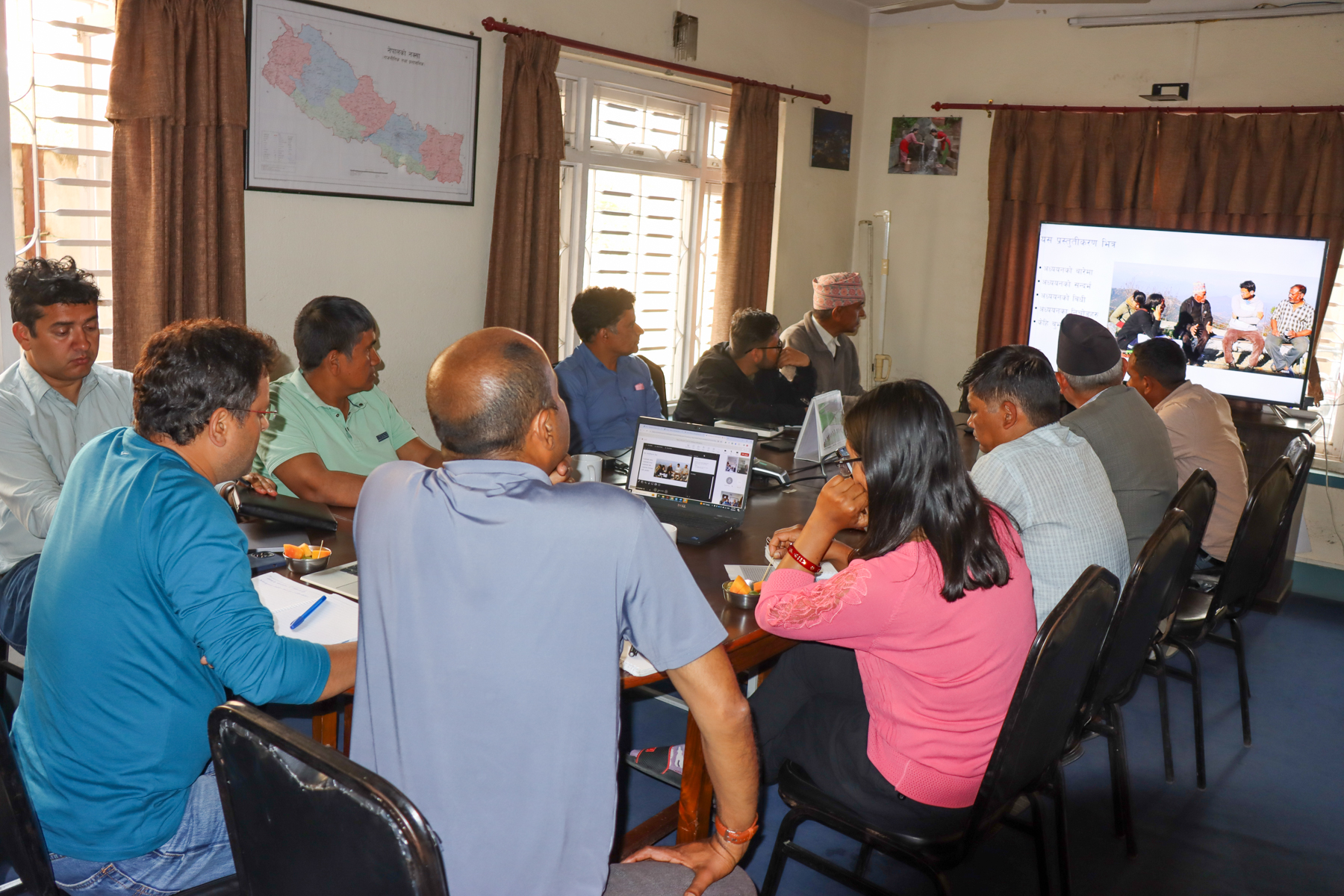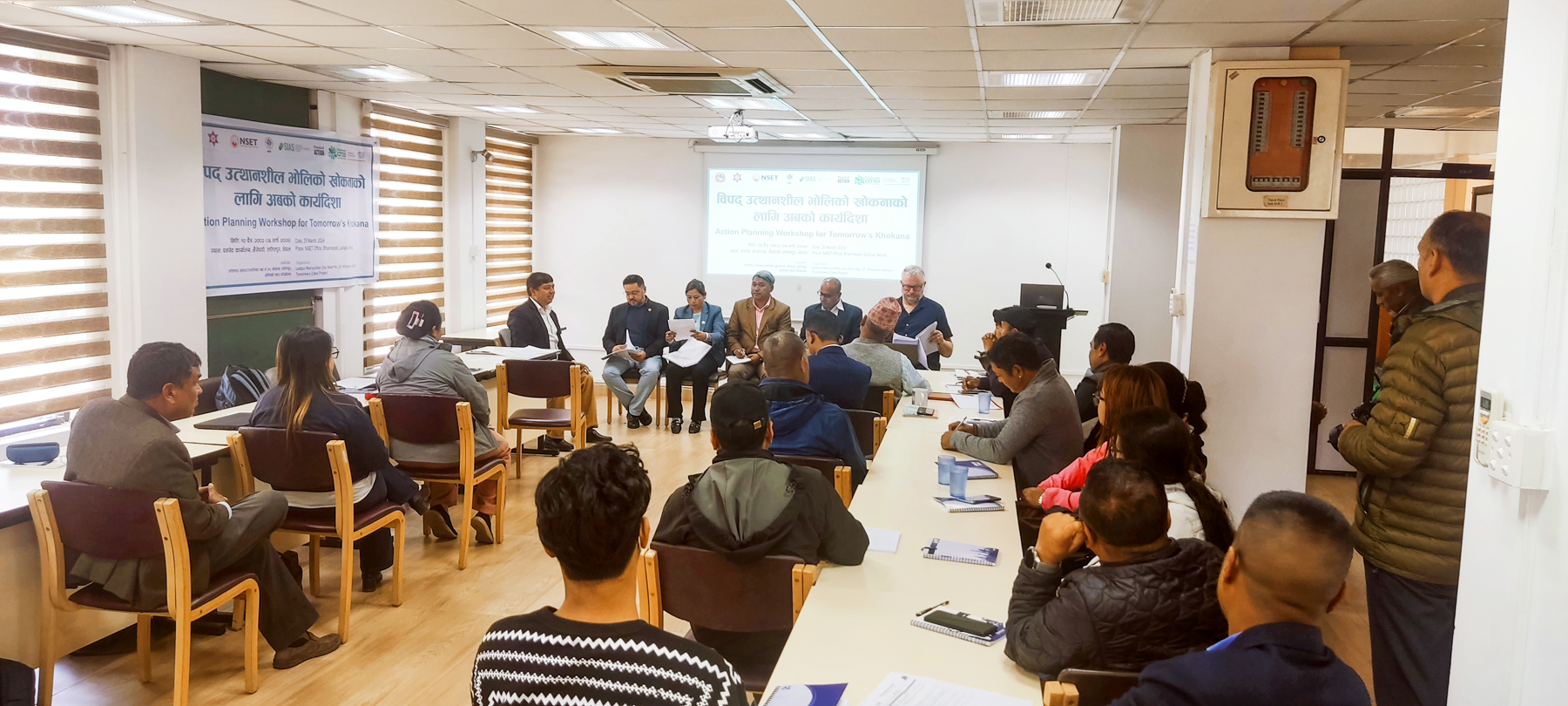On March 11, 2022, Southasia Institute of Advanced Studies (SIAS) conducted a local level inception workshop in Arghakhanchi. The workshop was organized as part of the “Co-producing a shock-resilient business ecosystem for women-led enterprises in Nepal” project funded by the International Development Research Centre (IDRC) and led by SIAS in collaboration with Aria Solutions, NIMS College and Himalayan Bio-Trade Pvt. Ltd. (HBTL). Arghakhanchi is one of the three study sites of the project where the action-research project will focus on vegetable-producing women’s cooperatives and groups.
The local level inception workshop aimed at bringing together possible project stakeholders of Arghakhanchi and impart information about the project, its approach, and expected outcomes. The workshop was attended by 20 participants from representatives of local government, banks, and cooperatives to local farmers. It lasted for two hours from 8:30 to 10:30 AM.
The session started with a brief introduction from all the participants. Dr. Mani Ram Banjade, Principal Investigator (PI), CREW officially began the workshop with an introductory presentation about the project. He provided a brief context behind the project and how it aims to create a supportive entrepreneurial ecosystem for women in Nepal considering external shocks, mainly COVID-19 and the ongoing climate crisis. He further focused on the limited role of women in agriculture because of different barriers and highlighted the project’s objective in Arghakhanchi to formulate realistic solutions for financially viable and shock-resilient agriculture-based enterprises that support women’s economic self-sufficiency.
Dr. Banjade shared a tentative project strategy in Arghakhanchi, according to which, local women cooperatives and local groups of women farmers will collaborate with a core marketing group that will further bring their agro-products to a broader market. The project envisions creating women champions and role models in Arghakhanchi who can inspire and continue with the project’s momentum for a sustainable impact.
As local cooperatives are at the core of this project in Arghakhanchi, it was important for the workshop to clarify the context behind the envisioned role of cooperatives in the project. Mr. Buddhi Raj Tamang from Aria Solutions shed light on this with a brief presentation. He brought into discussion the existing price instability in the vegetable market, irregularities in the supply chain and risks for farmers. With cooperatives accorded as one of the three pillars of the country’s economy by the Constitution of Nepal, they can play an instrumental role in eliminating the existing loopholes in the agricultural market, especially for women farmers. He concluded by emphasizing cooperatives as an exemplary model of a social enterprise and its pivotal role in the agricultural market.
After the presentations, the participants were divided into four different groups for an interactive discussion session. Each group had to center their discussion on two questions- gender-based barriers in vegetable price mechanism and solutions to overcome them- and later present their responses.
The farmers group put forward challenges such as rigid gender roles that limit women’s contributions beyond household chores, lack of timely and proper information regarding prices and consumer demands, and market inaccessibility. The second group represented by the local government echoed the previous group’s response and added the tendency of males to play a more active roles in negotiations, the dominance of elite, politically active women in public forums and ownership issues that hinder inclusive participation of women in marketisation.
The third group representing stakeholders highlighted poor digital outreach of women and multiple burdens of work that limit the participation of women in public forums, such as meetings. They suggested the need to create an efficient channel of communication and information dissemination.
The fourth group of women’s cooperatives emphasized the double work burden for women, lack of information and access to technology as primary barriers. They also added that since most men are involved in foreign employment, women have the pressure to shoulder added responsibilities. They suggested creating a conducive environment where women’s independent decision making is encouraged and respected.
Dr. Meeta Sainju Pradhan, Co-Principal Investigator (Co-PI) of the project summarized all the responses in the end. She highlighted the unequal social structures that limit women’s roles beyond household chores and lack of recognition of women’s work. Dr. Pradhan stressed that the status of women can only be improved if such traditional social structures can be altered.
Mr. Sobhakar Bhusal, Ward Chairperson, Ward No. 5, Malarani Rural Municipality wrapped up the presentations by supporting the pivotal role of cooperatives in strengthening the collection and marketisation of vegetables produced by farmers. He claimed that enhancing the roles of cooperatives can also help farmers receive fair pay for their produces.
Mr. Kamal Prasad Bhusal, Mayor, Sandhikharka Municipality, Arghakhanchi presented his remarks next. He stated that to receive returns that satisfy the investments made in the agricultural sector, the focus must be made to systemize marketing. He agreed that the vegetable business had not flourished well in Sandikharka and similar initiatives as made by the project are necessary. The workshop concluded with a final remarks from Dr. Mani Ram Banjade.




